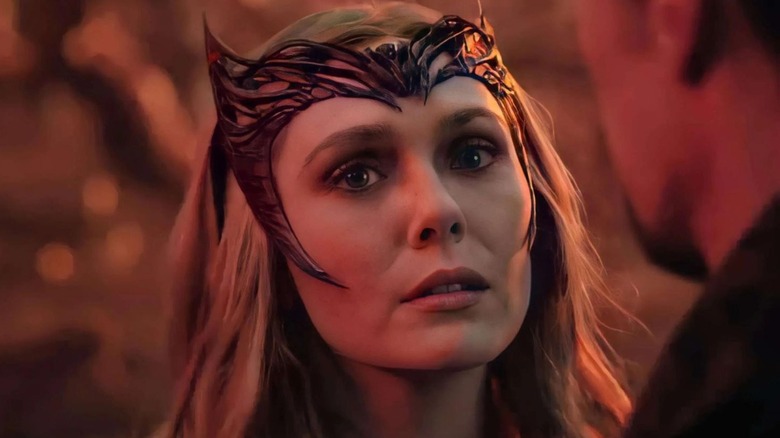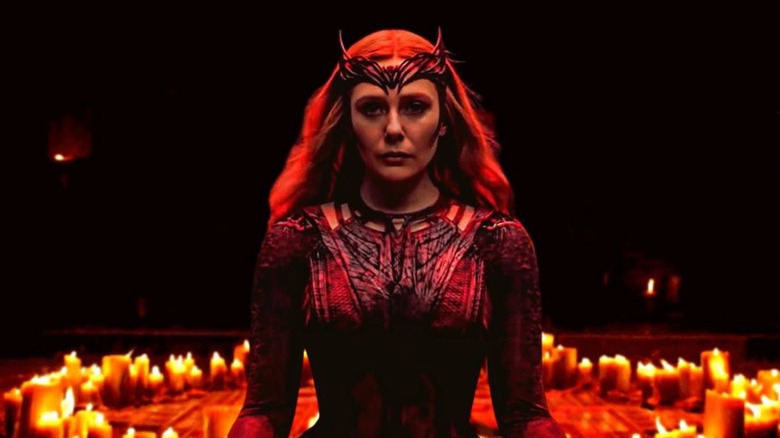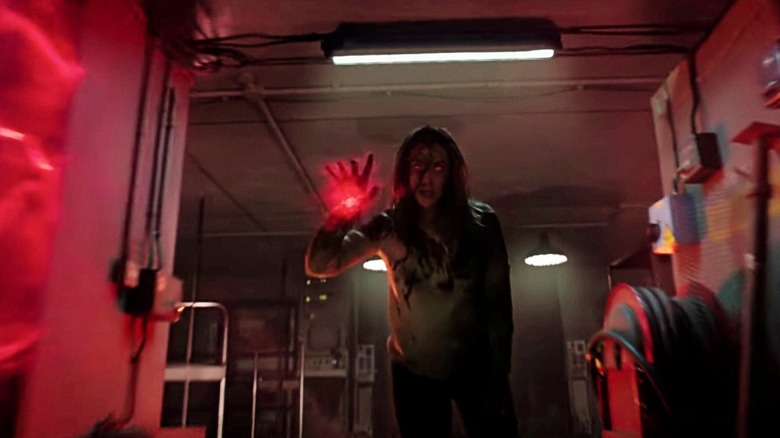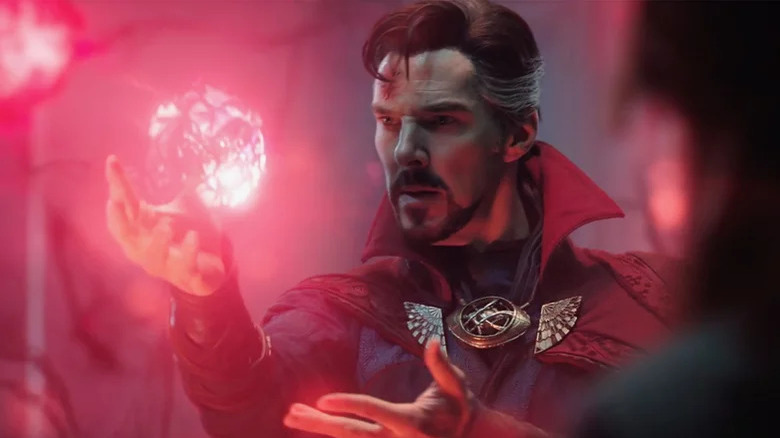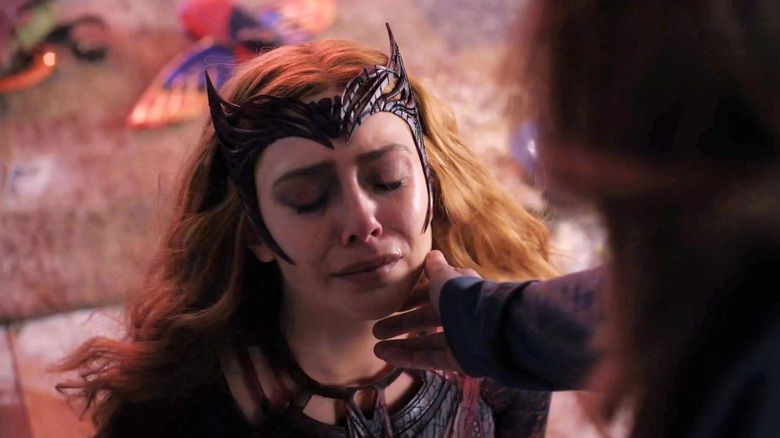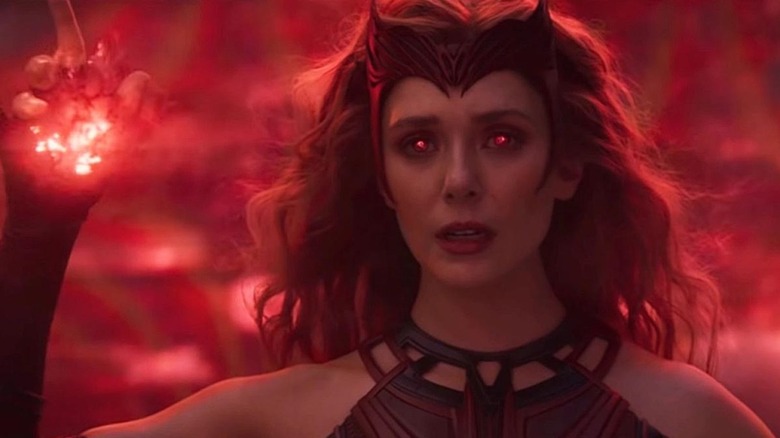Doctor Strange In The Multiverse Of Madness Is Actually The Wanda Maximoff Show
Warning: There are major spoilers for "Doctor Strange in the Multiverse of Madness" below.
I love Wanda Maximoff. That doesn't mean I sympathize with her for going on a murderous rampage. But I understand why she would do it.
For a long time, the Marvel Cinematic Universe has been pretty confused about what to do with the enigma that is Wanda Maximoff. It has been over seven years since she stormed into our lives. And in that time, Wanda has gone from being a nobody to a hero and finally, a villain. On some days, she was a morally grey character. She has loved, and she has lost. Her story paints a haunting portrait of the things we're willing to do to escape from our emotions.
In "Doctor Strange in the Multiverse of Madness," you'd expect Stephen Strange to be the star of the show, but it is Wanda who steals the spotlight. Still mourning the events of "WandaVision," she feels overwhelming pain, leading her to embrace the mantle of Scarlet Witch. Wanda allows the Darkhold, a grimoire teeming with forbidden spells, to fully corrupt her. She wants to reunite with her children, refusing to let the consequences of her actions influence her.
We often forget that this character has suffered significant emotional turmoil; she has lived through more grief than perhaps anyone in the MCU. She has been put through a lot. Tragedy is deeply rooted in Wanda's character arc, and life-changing conflicts are consistently thrown at her as if to see how long it would take for her to fight back. And yet, when she does fight back, it comes as a surprise. You take away someone's parents, their home, the love of their life, the family they endured so much to build, and reduce the reputation they fought to earn to nothing — and expect them never to retaliate? To quote Wanda, "That doesn't seem fair."
This time, Wanda fights back
In "Doctor Strange and the Multiverse of Madness," Wanda not only fights back — she accepts her identity as a villain. This isn't a betrayal of her character arc at the end of "WandaVision," it is a continuation of it. She understands her powers more than ever now and unleashes her wrath on anyone who stands in her way. Judging from the abilities given to Wanda and the pain she has been put through, can we blame her for turning into the film's big bad?
"WandaVision" was an effective character study that unraveled a side of Wanda Maximoff, but "Doctor Strange in the Multiverse of Madness" displays her journey from a desperate mother to a vulnerable witch on the precipice of ruin. Elizabeth Olsen's show-stealing performance of the profoundly layered character outshines everyone else in the film. "Doctor Strange in the Multiverse of Madness" is all things Wanda Maximoff, and others work on the sidelines.
Wanda takes the reins off her powers
Wanda is a powerful being beyond help in "Multiverse of Madness." Her grief and trauma have devoured her whole, with the inescapable dreams of a happy life with her children tormenting her every night, preventing her from moving on, and pushing her to lean into her darker proclivities. In this movie, it is not Wanda but the Scarlet Witch who steers the ship. She is the strongest living Avenger, and the film goes to shocking lengths to demonstrate that.
The "Doctor Strange" sequel lets Wanda shine; gone is the seemingly scared and fragile woman who was hidden away in HYDRA's research facility. She tried playing hero for a while, which cost her everything, bringing her nothing but immeasurable loss and grief. So Wanda allows her powers to take over, for the Darkhold to consume her.
She obliterates everything that steps in her way. She sends monsters to abduct a defenseless fourteen-year-old girl. She destroys a centuries-old magical enclave. She brutally murders one of the most powerful secret organizations in the history of Marvel Comics — manipulating Black Bolt to implode his own head, turning Reed Richards to string cheese, slicing Agent Carter into two, dropping a massive stone figure on Captain Marvel, and snapping Professor Charles Xavier's neck. And she looks badass while doing it. Did I enjoy watching Wanda desecrate everything and everyone all at once? Sure. But I wouldn't say I liked her reasoning for it.
Doctor ... who?
I love Doctor Strange (and, by extension, Benedict Cumberbatch). His superhero origin story is deeply compelling; his standalone movie is a wild, psychedelic trip and an excellent introduction to the former surgeon and now Master of the Mystic Arts. He is the best part of his first solo movie. But he isn't the star of its sequel.
Elizabeth Olsen unleashes something quite frightening with her role, filling her character's personality with body language straight out of a horror movie. She embraces the darkest aspects of Wanda's chaos magic, chasing after characters like an ax murderer would, delivering the most chilling performance with a word or a whisper, and contorting her body so unnaturally that Wanda's escape from Doctor Strange's mirror dimension becomes reminiscent of Samara crawling out of a television in "The Ring."
Elizabeth Olsen's performance makes the viewer forget that this is supposed to be a movie about Doctor Strange dealing with the repercussions of a torn-open multiverse. Instead, it becomes an unraveling of Wanda Maximoff's psyche. It's deliciously campy, and Olsen's performance is everything that's great about the movie. The film solidifies the Scarlet Witch as the MCU's scariest villain and makes Thanos look like a joke.
Wanda's actions lack reason but not emotional depth
While I'm not in agreement with Wanda's actions in "Doctor Strange in the Multiverse of Madness," I don't believe she acted out of character. She's still the MCU's most fascinating villain to me; Wanda nearly successfully manipulated Doctor Strange into believing she had good intentions, eliminated almost every member of the Illuminati, and no one could stop her from pursuing America Chavez but herself. No superhero — not Stephen Strange or even the Sorcerer Supreme — was strong enough to stop her. If it weren't for her reunion with her multiversal children, Wanda would've never discovered the truth of what she had done.
The Internet is pretty divided over the film's treatment of Wanda; to some, it feels like a betrayal of her "WandaVision" character arc. Here's the thing though: Wanda never redeemed herself at the end of the Disney+ show. Holding a town captive and resurrecting your dead boyfriend to live out your domestic fantasy aren't the actions of a hero. Nor is reversing your crime, only to isolate yourself and study a book of evil spells. The reason why "Doctor Strange in the Multiverse of Madness" is flawed isn't that it pits Wanda as the villain. It is because Wanda's evolution into a villain happens behind the scenes, and we're expected to read between the lines.
Wanda's path always led to her becoming the Scarlet Witch
Wanda's explosion of power and pain isn't uncalled for — it was always inevitable. She never resigned to her reality at the end of "WandaVision," because she wouldn't be holding onto the Darkhold for dear life if she did. What makes Wanda so compelling is the fact that she isn't a one-dimensional character. She is unpredictable, she's hurt, she's angry, and she's choosing to do something about it. She is anchored by a certain emotional weight that we rarely see in villains. Her journey might feel rushed, some fans will call it character assassination, but in all earnestness, it is just a continuation of her emotional story arc.
Instead of ending her journey as a villain through a cheap act of redemption, what the MCU needs to do is let this side of the character shine. If Wanda brings chaos, let her bring chaos. From her first appearance in the MCU, Wanda has been manipulated, her actions left to be interpreted by those in a position of power. She has been used and cast aside; her abilities have been exploited for the whims and fancies of others. She watched her home taken away from her, was forced to kill the only man she's ever loved, and lost her children to a tragedy she couldn't control.
Considering her journey in the MCU so far, Wanda was always meant to become a villain. The only difference is, that she's the kind of villain who is capable of doing the right thing in the end. It's what sets her aside from all the other villains we've seen in the MCU all these years.
"Doctor Strange in the Multiverse of Madness" is in theaters now.
